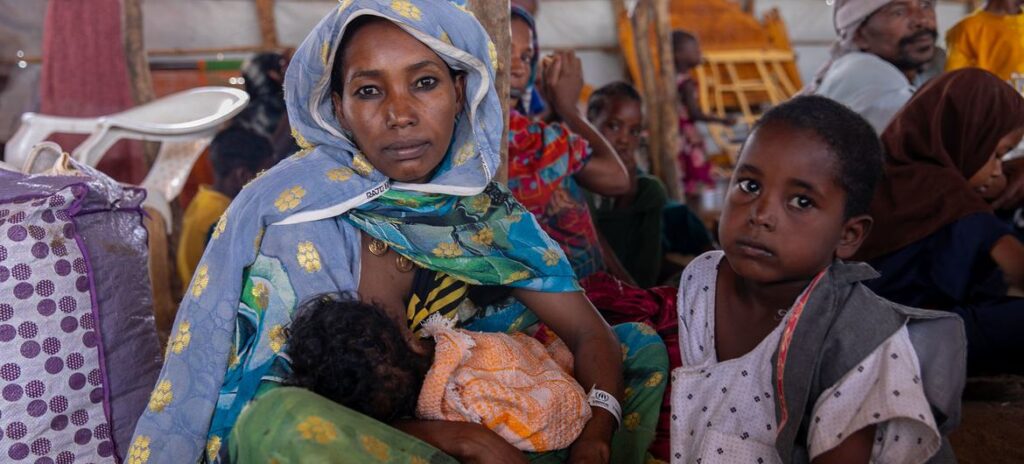
Nearly 25,000 people fled to eastern Chad in the first week of October alone, marking the highest weekly influx this year. This follows months of intensifying violence in Darfurand Chad now hosts over 600,000 Sudanese refugees, which is more than any other country in the region.
Since the conflict began eighteen months ago, almost three million refugees have fled Sudanseeking security in countries such as the Central African Republic, Egypt, Ethiopia, Libya, South Sudan and Uganda.
Within Sudan itself the International Organization for Migration (IOM) reports that almost 40,000 people were displaced for the first time in the first half of October alone. Total internal displacement now stands at almost 8.2 million.
Crucial moment for help
As rains subside, aid agencies are rushing to deliver essential supplies to the hardest-hit areas. OCHA calls on all parties to stop fighting, protect civilians and facilitate humanitarian access. In Chad, the Birak Health Center is being overwhelmed by the influx of refugees, with funding shortfalls delaying the delivery of essential services.
Meanwhile, the cholera outbreak continues to worsen, with more than 24,000 reported cases and 700 deaths since mid-July. The UN refugee agency,UNHCRis working to relocate refugees and provide mass vaccination, but funding constraints remain.
Gaza: Aid supplies are available, but no access to people in need
There are currently 100,000 tons of food waiting to be imported into Gaza by the World Food Program and the UN Palestinian Refugee Agency.UNRWA), which means enough food for everyone for the next three to four months UNRWA Representative Scott Andersen briefs journalists at UN Headquarters in New York on Wednesday.
However, while supplies are available, Mr Anderson says there is no environment in which they need to be delivered.
“It’s just hard to get help to people,” he said, noting that prior to Israel’s Rafah offensive in May, the arrivals were 350 trucks a day — a figure that has shrunk to 30 trucks on a good day.
UNRWA is working closely with the Israeli Defense Forces (IDF) to try to create a more favorable environment for aid workers to receive supplies, but “we’re not quite there yet,” Mr Anderson said.
About 470,000 people remain in northern Gaza amid an ongoing IDF operation. Of these, 65,000 have been displaced again.
Meanwhile, in the declared humanitarian zone in the south, 1.4 million people find themselves in a shrinking space.
Mantra continues: Nowhere is safe
Even in the zone, Mr. Anderson said, “nowhere in Gaza is safe,” pointing to the air and missile strikes that have taken place there and killed many civilians.
Mr Anderson added that the hospitals exist “somewhat in name only” due to the lack of equipment and supplies needed for good secondary and tertiary care following the strikes.
625,000 children in Gaza are also currently not receiving primary education, which, combined with the consequences of… COVID-19This makes this the fourth year in five that they have missed formal education.
“I am very concerned about the lost generation,” he said, emphasizing the impact this will also have on generations as these children become parents themselves.
South Sudan: UN reports a sharp increase in violence against civilians
The UN Mission in South Sudan (UNMISS) has urged the government to protect the population by preventing repeated cycles of violence.
The latest ONMISS quarterly overviewcovering the period from April to June, shows a sharp increase in the number of violent incidents involving civilians, including kidnappings and attacks on women.
The mission recorded 317 incidents involving at least 1,062 civilians, including 160 women and 188 children. Of this number, 442 were killed, 297 injured, 197 kidnapped and 126 subjected to sexual violence.
This represents an increase of 43 percent in incidents and a 22 percent increase in the number of victims, compared to the same period in 2023.
The figures also indicate a 32 percent increase in the number of violent incidents and a 16 percent increase in the number of victims, compared to the first quarter of this year (January to March).
Kidnappings and sexual violence
UNMISS was particularly concerned about the increase in documented kidnappings and sexual violence compared to the previous quarter.
The number of kidnappings rose by an alarming 181 percent, from 70 to 197, with most documented in parts of Juba, Morobo and Yei provinces in Central Equatoria State.
Similarly, the number of victims of sexual violence increased by 168 percent, from 27 to 126.
Tambura province in Western Equatoria state recorded the highest incidents of conflict-related sexual violence – an issue that continues to disproportionately affect women and girls, who make up 99 percent of victims.
The mission said inter/intra-community violence by community militias and/or civil protection groups related to border disputes, cross-border violence, cyclical and retaliatory attacks, as well as ethnic polarization, remain the main source of subnational violence.
This unrest was responsible for 83 percent of the casualties, 883 people. However, national trends in violence involving conventional parties to the conflict remained low during the reporting period.
The UN human rights office calls for a halt to the execution of two men in the US
The UN Human Rights Office, OHCHRhas urged lawmakers in the United States to join a growing number of countries that have abolished the death penalty.
The appeal comes ahead of Thursday’s scheduled execution in the US of two men: Robert Robertson and Derrick Dearman.
Mr. Robertson’s death sentence was handed down “despite substantial evidence of wrongful conviction,” OHCHR said, noting that six people were executed in five different U.S. states over a 12-day period last month.
“This increase in executions is deeply concerning,” OHCHR spokesman Seif Magango said, adding that evidence suggested the punishment has “little to no effect on deterring crime.”
According to OHCHR, approximately 170 countries have abolished the death penalty to date.







